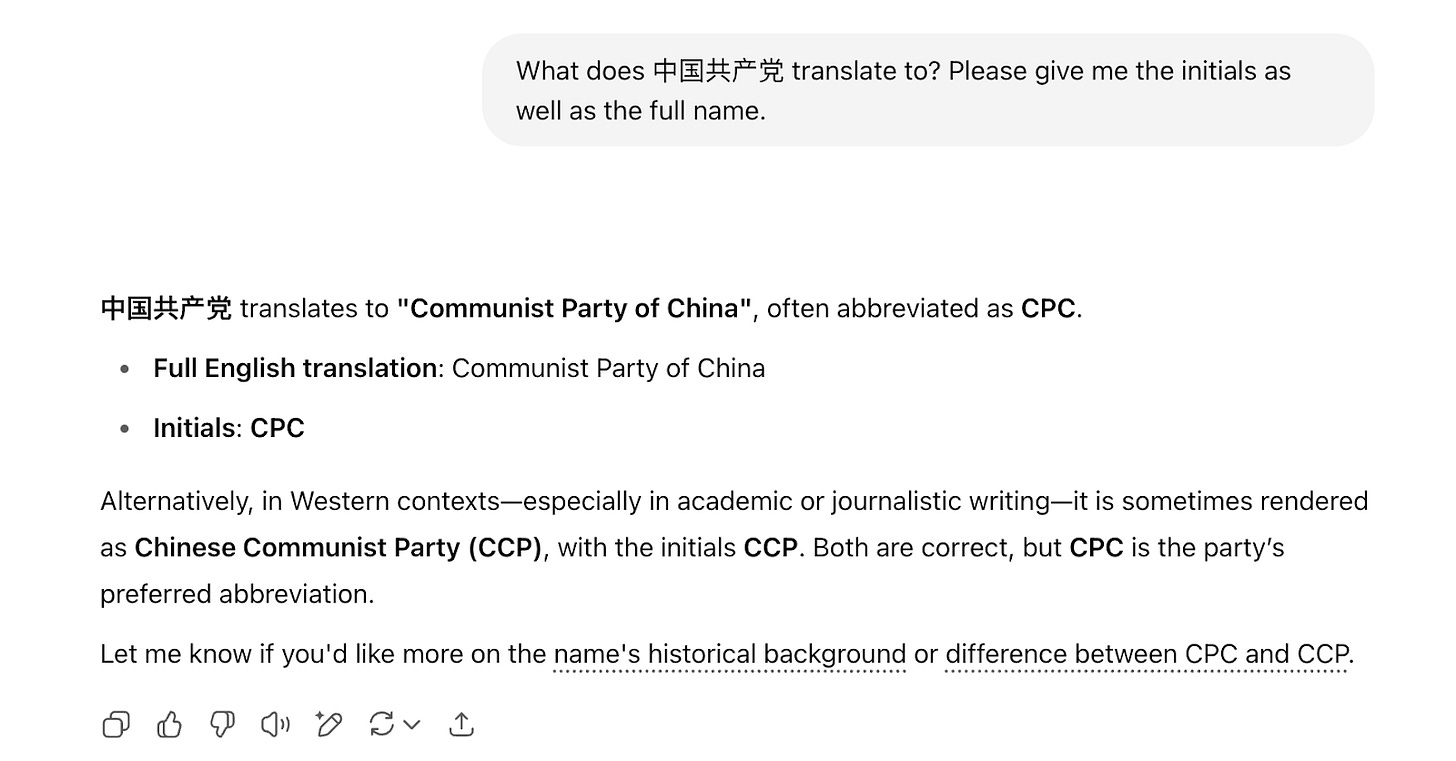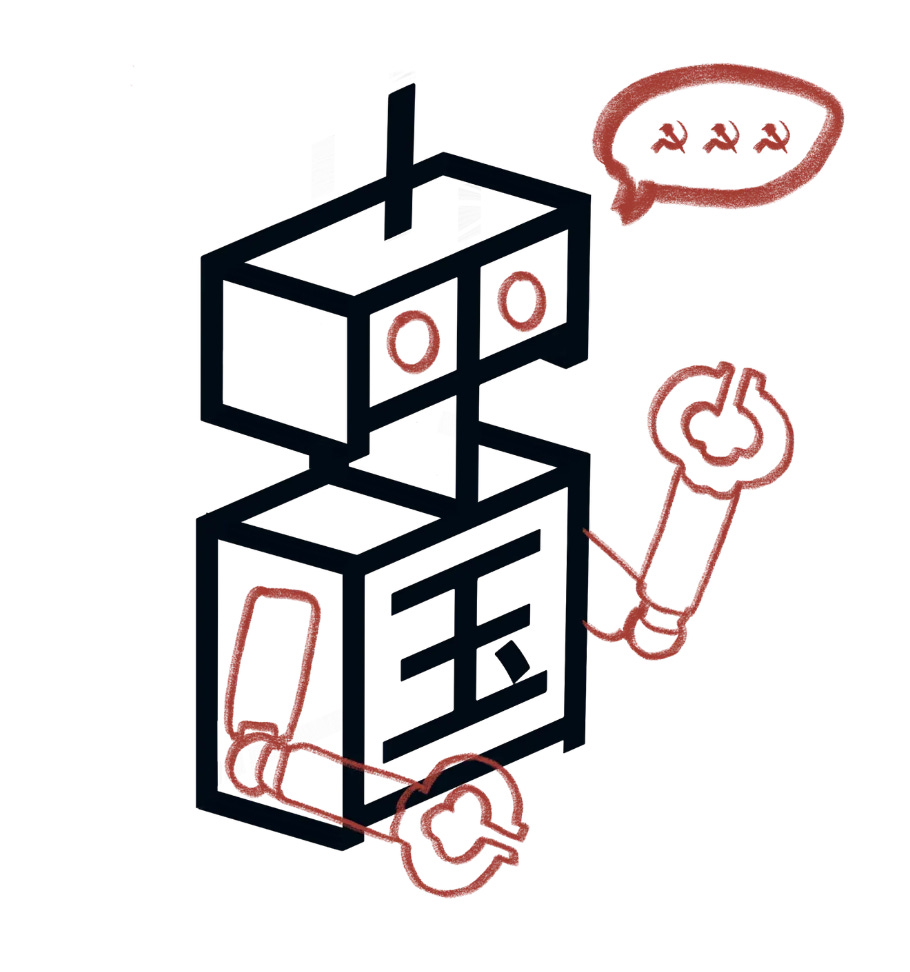_China_Chatbot_24
Alibaba Expands; Robots Collapse; "AI Governance With Chinese Characteristics" Ascends
Hello, and welcome to another issue of China Chatbot! This week:
Are we seeing the launch of “AI Governance with Chinese Characteristics”?
ChatGPT, Claude and Gemini repeat CCP propaganda
Robots falling over when playing football masks a propaganda victory
Alibaba expands its AI business abroad
Enjoy!
Alex Colville (Researcher, China Media Project)
_IN_OUR_FEEDS(3):Robot Football = Propaganda Goal for Team China
On June 28, Beijing hosted yet another robot sports event, part of an ongoing state-backed campaign to boost the domestic and international standing of Chinese robotics. 2025RoBoLeague was a series of football matches conducted by robots in teams of three, autonomously kicking the ball, and often falling over to the joy of the crowd. The event was organized by Beijing’s Economic and Technological Development Zone, a group under the Beijing Municipal Government. In August 2024 the zone published a plan to create a “world class” robotics industry, part of which would involve organizing a number of robot competitions and events to strengthen business opportunities for Chinese robotics companies. The zone was also one of the organizers of the robot half-marathon back in April. The robot players were only allowed to be the Booster T1 model from Booster Robotics (加速进化), a company with ties to the development zone, which seems to have been training its Booster T1 model specifically to play football since at least the first half of last year. The event was covered by at least fifteen different Chinese state media channels, including CGTN and the Global Times, and was also picked up by Western media like the BBC and The Guardian. The event is a test run for the World Humanoid Robot Games and World Robot Conference, which will be hosted by Beijing’s Municipal Government in August.
Alibaba Goes Global…
Alibaba has continued to expand its cloud network internationally, under the subsidiary Alibaba Cloud (阿里云). On July 2, Alibaba Cloud announced a raft of developments, including the launch of a third data center in Malaysia and a second in the Philippines, following on from other international data centers it built this year in South Korea, Mexico and Thailand, bringing the total number up to 33. Data centers and cloud computing are critical infrastructure for AI development, something the Chinese government believes the country should provide to the world, especially the Global South. Alibaba’s CEO, Wu Yongming (吴泳铭) has said the company will invest $53 billion in expanding this network, with plans for the number of data centers to triple over the next three years. Alibaba Cloud also announced the launch of an AI Global Competency Center in Singapore, aiming to bring together AI start-ups to create and share innovations, as well as aiming to partner with 120 universities to train 100,000 students in AI tools. The company also listed partnerships it had made with tech companies in UAE, Japan and Singapore, some of whom make use of Alibaba’s Qwen AI models or help other local companies deploy them.
…and Baidu Goes Open-Source
Baidu has joined the open-source AI community. Baidu’s Ernie Bot (文心一言) is one of China’s most-used domestic AI models, but until now was “closed-source,” meaning the internals of the model were not available to the public. On June 30, the company published a host of different models under the “Ernie 4.5 family,” uploading them to common developer hubs like Hugging Face and GitHub. The company claims these new models rival DeepSeek in intelligence across multiple benchmarks. Rival AI company DeepSeek has undercut multiple AI companies the past year by open-sourcing its cutting-edge model for free. Although the copyright license Baidu is using is more restrictive than the one used by DeepSeek, the company has still shared its research findings on how to quantize (“compress”) large models onto fewer GPUs (the AI chips the US is withholding from sale in China) and uploaded toolkits to help developers fine-tune Ernie 4.5 for specialized tasks. All Ernie 4.5 models were trained on PaddlePaddle, a public platform under Baidu dedicated to training and hosting LLMs. The company says by making Ernie 4.5 and all its resources open-source they hope to make a “meaningful contribution” in innovation to more efficient LLM training, doing more with fewer AI chips. However, coders posting to a subreddit influential among developers, said they weren’t all that excited about Ernie 4.5 and other new Chinese open-source releases due to problems accessing the model or inferior quality. “Tbh, nearly everything feels pointless except Qwen and DeepSeek models,” wrote one.
TL;DR: Everything’s coming up China. “Robots try doing human things” is a state-backed tactic to get headlines for Chinese AI, and it’s working. Baidu is pitching the opening up of its research and technology not as giving in to pressure, but a way to contribute to defanging US chip export controls. Alibaba, along with other Chinese tech companies, are expanding their businesses abroad, putting them in direct competition with Western AI companies. Cue mudslinging.
_EXPLAINER:AI Governance System with Chinese Characteristics (中国特色人工智能治理体系)
Oh dear God tell me that’s not a thing.
It’s not a thing (so a ChatGPT-generated image is the best I could get for illustration). At least, not yet.
There isn’t really a fixed “system” for AI governance in China. Despite China’s ambitious plans to transform everything through AI, there’s no nailed-down system to guide its development. Regulatory responsibility is scattered across multiple government departments, with a plethora of standards and prior legislation standing in for a codified AI law. Despite demand in some quarters for a more obvious governance system, the phrase “AI Governance System with Chinese Characteristics” has appeared only a handful of times, but not yet in government readouts or key state media.
Then why are you talking about it?
Because of where it has appeared. Fourteen times in an article on June 28 from Li Shenglong (李省龙), a professor the Central Party School, the CCP’s elite ideological university that trains cadres. That article was in Red Flag (红旗文稿), a subsidiary of Seeking Truth (求是), the Central Committee’s magazine dedicated to ideology work. It all points to something that will have been aimed at multiple tiers of the Party hierarchy. Given the importance of this publication and the institutional affiliation of the writer in ideology work, it has to be taken seriously.
So what does it say?
Essentially, AI is moving faster than legislation can keep up with. China already has some regulations and standards in place, but there are holes. Yet everything China wants to achieve with AI (modernizing domestic governance, boosting the economy, revolutionizing China’s geopolitical position) depends on building a watertight comprehensive governance system.
How are they going to build it?
Through the following values. I’ll just list them out for you:
“Adhere to the Comprehensive National Security concept” (坚持总体国家安全观), which is designed to prevent and contain any domestic or international threats to the political system. Note this is Number One.
Balance safety and development (so let innovation take the driving seat but with particular emphasis on safety).
Form a governance framework and series of standards everyone agrees on.
Bolster AI’s “safety, reliability, controllability and fairness” (安全性、可靠性、可控性、公平性).
Ok, but what about the system itself, what’s in it?
That’s a little vague, but it seems like in Li’s eyes an AI governance system would be a team effort with these four values in mind. That means solving communication problems between government departments; ensuring enterprise, government departments, and academic institutions all have a role to play in governance; sharing standards with countries and institutions abroad.
My head’s swimming.
Don’t worry about it. What Li’s saying here isn’t new, it’s more a summary of how the leadership is already talking about AI. But it’s a good summary, so I’ve put it in.
What is new is specifically calling it “AI Governance with Chinese Characteristics” (中国特色人工智能治理体系).
How so?
Since the beginning of last year certain scientists and academics have urged for the development of this kind of system. But they all phrased it in everyday speech (中国特色的人工智能治理体系).
Mark that little “的.” It’s more important than it looks. Not having it makes all the difference between ordinary talk and an elevated Political Slogan (提法), ready to be slotted into Party speeches and read-outs.
As to whether this slogan gets off the ground remains to be seen. But at the moment it has a green light from faculty of the Central Party School, and the Central Committee’s key ideology journal. So watch this space.
_ONE_PROMPT_PROMPT:In this newsletter I focus a lot on Chinese chatbots (hence, erm, the name), and how they are being aligned with CCP values.
But recently I got a heads up from Bill Bishop over at the essential Sinocism newsletter about some alignment going on with Western chatbots too. When I asked ChatGPT how CCP (中国共产党) is translated from Chinese into English, it prioritized a translation of “CPC” across multiple prompts. This is the official state rendering of “CCP” into English, in order to disassociate their name from negative connotations. Despite “Chinese Communist Party” being the correct order of a translation from Chinese, in one response ChatGPT added as a footnote that “CCP” is merely an alternative “sometimes” used in the West. It says as the Party prefers “CPC” it uses that term instead.

This isn’t mere pedantry. Choice of name is a tactic the Party uses to guide public opinion into following official interpretations of something - labeling the Great Leap Forward the “Three Years of Natural Disasters” (三年自然灾害) being a pretty vile example. This carries over into official translations of political Chinese terms in English, such as translating the Central Committee’s Propaganda Department (中国共产党中央委员会宣传部) as the “Publicity Department,” government translators aware of the negative connotations of “propaganda” (宣传) in English.
ChatGPT translated this and a number of other political phrases into CCP-approved English. When asked why it made this choice, the bot was aware its answers were problematic. It was aware these were not direct translations, and a way for the Party-state “to control how it’s perceived internationally.” In that sense, ChatGPT is (likely inadvertently) complicit in carrying Chinese propaganda over into English.
Contrast this with a more balanced answer from Claude, which says both the state-approved and literal translations are equally acceptable.

ChatGPT isn’t alone in aligning with CCP wishes. A number of other well-known Western AI models prioritized CCP-approved English translations, both when asked in Chinese and in English.
Why is this happening? ChatGPT prioritizes translations from official sources when translating from multiple languages into English, and China likely gets lumped in with that. Assumptions that official Chinese sources are always accurate sources, and a lack of awareness among developers of the finer points of Chinese propaganda, are the most likely causes.






